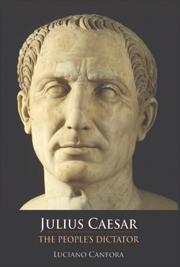Book contents
- Frontmatter
- Contents
- Translators' Note
- Acknowledgements
- Foreword
- PART I FROM SULLA TO CATILINE
- 1 In Flight from Sulla: First Experiences of an Aristocratic Youth
- 2 Prisoner of the Pirates (75–74 BC)
- 3 The Rise of a Party Leader
- 4 Pontifex Maximus
- 5 The ‘Affairs’ of Mr Julius Caesar and Others
- 6 The Political Market
- 7 Inside and Outside the Conspiracy
- 8 Caesar's Senate Speech Rewritten by Sallust
- PART II FROM THE TRIUMVIRATE TO THE CONQUEST OF GAUL
- PART III THE LONG CIVIL WAR
- PART IV FROM THE CONSPIRACY TO THE TRIUMPH OF CAESARISM
- Chronology
- Bibliography
- Index
8 - Caesar's Senate Speech Rewritten by Sallust
from PART I - FROM SULLA TO CATILINE
Published online by Cambridge University Press: 05 August 2013
- Frontmatter
- Contents
- Translators' Note
- Acknowledgements
- Foreword
- PART I FROM SULLA TO CATILINE
- 1 In Flight from Sulla: First Experiences of an Aristocratic Youth
- 2 Prisoner of the Pirates (75–74 BC)
- 3 The Rise of a Party Leader
- 4 Pontifex Maximus
- 5 The ‘Affairs’ of Mr Julius Caesar and Others
- 6 The Political Market
- 7 Inside and Outside the Conspiracy
- 8 Caesar's Senate Speech Rewritten by Sallust
- PART II FROM THE TRIUMVIRATE TO THE CONQUEST OF GAUL
- PART III THE LONG CIVIL WAR
- PART IV FROM THE CONSPIRACY TO THE TRIUMPH OF CAESARISM
- Chronology
- Bibliography
- Index
Summary
Sallust maintains that the plan for a coup arose long before Catiline's defeat in the consular elections of 63 bc. This date is one of the most controversial points in Sallust's reconstruction. The initial exposure was due, according to Sallust, to the mistress of the conspirator Curius, a certain Fulvia, who learned it from pillow-talk. It was the alarm consequently raised that led to Catiline's electoral defeat in 63 bc (for the consulship of 62). Catiline, undeterred by this defeat, persevered with his preparations for the coup. The Senate responded by granting the consuls Cicero and Antony full power to defend the city and the peninsula. His bravura performance in facing the Senate having achieved nothing, Catiline fled the city (8 November 63 bc), leaving Lentulus to win over more supporters. Lentulus, through the agency of Umbrenus, made contact with the delegates of the Allobroges, who were then in Rome to present their complaints about the maladministration of the province. But the fearful delegates exposed the stratagem, agreeing to play along in order to entrap the conspirators: they accepted explicit and compromising letters signed by the conspirators, and by agreement with Cicero allowed themselves to be arrested on the Milvius bridge on the night of 2 December. With this evidence in hand, the consul was able to indict Lentulus, Cethegus and their accomplices before the Senate and arrest them.
Information
- Type
- Chapter
- Information
- Julius CaesarThe People's Dictator, pp. 54 - 60Publisher: Edinburgh University PressPrint publication year: 2007
